It’s the time of year when trees are budding, flowers are blooming, and life is renewing. But with these wonderful changes, comes not so wonderful allergy symptoms.
Seasonal allergies, also known as allergic rhinitis or hay fever, affect millions of people worldwide, causing symptoms such as sneezing, nasal congestion, itchy eyes, and coughing. While over-the-counter and prescription medications are commonly used to manage these symptoms, some individuals choose to seek natural alternatives to alleviate their discomfort. Which is where we come into play!
Why Do We Experience Seasonal Allergies?
Herbs have long been used in traditional medicine systems for their potential therapeutic effects, and several herbs are gaining attention for their ability to support the body's response to seasonal allergies. From nettle and turmeric to ashwagandha and ginger, these herbs offer various mechanisms of action, including anti-inflammatory, antihistamine, and immune-supporting properties. Understanding the potential benefits and mechanisms of action of these herbs can provide individuals with additional options for managing their seasonal allergy symptoms effectively and naturally.
We hand-picked the herbs in this blend from years of study and research. Let’s dive into them!
Herbs For Seasonal Allergy Support

We chose six different herbs for this herbal tea blend Nettle (Urtica dioica), Lemongrass (Cymbopogon citratus), Turmeric (Curcuma longa), Marshmallow Root (Althaea officinalis), Peppermint Leaf (Mentha piperita), and Ashwagandha (Withania somnifera). These herbs not only help support a decrease in reaction to allergies, but they also soothe your system at the same time.
When we create tea blends, we approach them two-fold, with the mission of supporting an ailment while simultaneously providing a soothing, comforting support as well. That is why you see things like chamomile flowers or marshmallow root in a lot fo our blends. Anyways, let’s dive into the herbs in the Allergy Ease Support Tea.
1. Nettle (Urtica dioica)
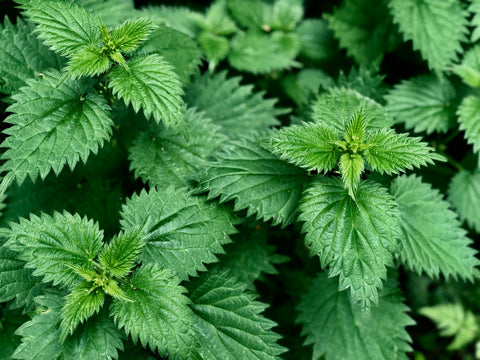
Stinging nettle, has been traditionally used for various medicinal purposes, including the management of seasonal allergies. Here are some potential benefits of nettle for seasonal allergies:
- Anti-inflammatory properties: Nettle contains compounds that have anti-inflammatory properties, which may help reduce inflammation associated with allergic reactions (1).
- Histamine reduction: Nettle contains substances that act as natural antihistamines, which can help block the effects of histamine in the body. Some research suggests that nettle may help reduce the release of histamine, a compound that triggers allergy symptoms like sneezing and itching (2).
- Symptom relief: Studies have shown that nettle may help alleviate symptoms such as sneezing, itching, and congestion commonly experienced during allergy seasons (3).
- Supports immune function: Nettle is rich in vitamins and minerals that support overall immune function, potentially helping the body better cope with allergens (4).
2. Lemongrass (Cymbopogon citratus)
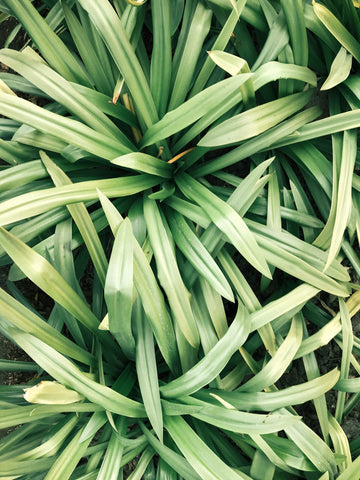
While lemongrass is not typically considered a primary remedy for seasonal allergies like nettle, it does offer some potential benefits that may indirectly support allergy relief, while supporting the general immune system as well.
- Anti-inflammatory properties: Lemongrass contains compounds such as citral and geraniol, which have anti-inflammatory properties. By reducing inflammation in the body, lemongrass may help alleviate some of the discomfort associated with allergic reactions (5).
- Antioxidant activity: Lemongrass is rich in antioxidants, which help neutralize harmful free radicals in the body. By reducing oxidative stress, lemongrass may support overall immune function and potentially reduce the severity of allergic reactions (6).
- Respiratory support: Lemongrass has a refreshing aroma and contains volatile oils that have been traditionally used to support respiratory health. While not a direct treatment for allergies, inhaling the aroma of lemongrass essential oil may provide temporary relief from congestion and respiratory discomfort associated with allergies (7).
- Stress reduction: Allergy symptoms can sometimes be exacerbated by stress, so anything that helps reduce stress levels may indirectly alleviate allergy symptoms. Lemongrass has a calming effect and is often used in aromatherapy to promote relaxation and reduce anxiety, which could help individuals better cope with allergy symptoms (8).
3. Turmeric (Curcuma longa)
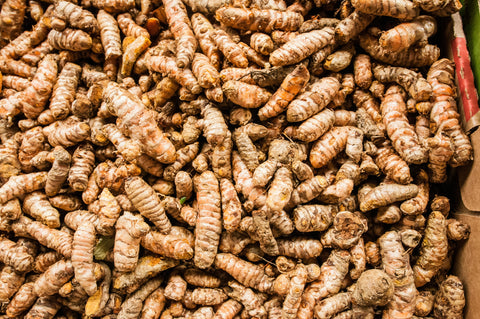
Turmeric root, commonly used in traditional medicine, possesses several potential benefits that may indirectly support individuals with seasonal allergies. Turmeric root is a powerful anti-inflammatory that both directly impacts the bodies reaction to seasonal allergies as well as general immune support too.
-
Anti-inflammatory properties: Curcumin, the main active compound in turmeric, exhibits potent anti-inflammatory effects. By reducing inflammation in the body, turmeric may help alleviate symptoms associated with allergic reactions, such as nasal congestion and irritation (9).
-
Antioxidant activity: Turmeric contains antioxidants that can neutralize harmful free radicals in the body. By reducing oxidative stress, turmeric may support overall immune function and potentially alleviate the severity of allergic reactions (10).
-
Immune modulation: Some research suggests that curcumin may modulate the activity of immune cells, potentially helping to regulate the immune response to allergens. This immune-modulating effect could contribute to reduced allergy symptoms (11).
-
Respiratory support: Turmeric has been used traditionally to support respiratory health. While not a direct treatment for allergies, turmeric may help alleviate respiratory symptoms such as coughing and throat irritation, making it easier for individuals to cope with allergy symptoms (12).
-
Sinus relief: Turmeric's anti-inflammatory properties may help reduce inflammation in the sinuses, which can become inflamed during allergic reactions. This could lead to relief from sinus congestion and pressure associated with seasonal allergies (13).
4. Marshmallow Root (Althaea officinalis)
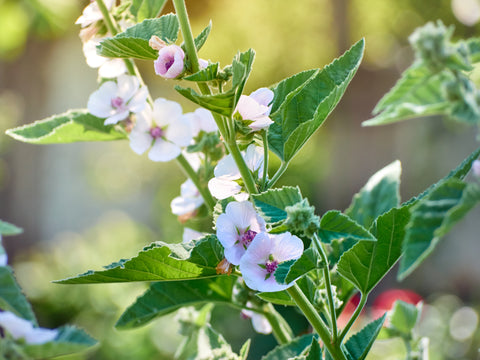
Marshmallow root, known scientifically as Althaea officinalis, has a range of beneficial properties from working as an expectorant and anti-inflammatory. In general, marshmallow root is a wonderfully soothing herb, which is part of the reason we included it in this tea blend.
-
Soothing effect: Marshmallow root contains mucilage, a gel-like substance that forms a protective layer when ingested. This mucilage can help soothe irritated mucous membranes in the respiratory tract, potentially providing relief from allergy-related throat irritation and coughing (14).
-
Anti-inflammatory properties: Marshmallow root has been traditionally used as an anti-inflammatory agent. It may help reduce inflammation in the respiratory tract, alleviating symptoms such as nasal congestion and irritation associated with seasonal allergies (15).
-
Immune support: Marshmallow root contains compounds that may support immune function. By bolstering the immune system, marshmallow root may help the body better cope with allergens and reduce the severity of allergic reactions (16).
-
Expectorant properties: Marshmallow root is known for its mild expectorant properties, which may help loosen mucus in the respiratory tract and promote its expulsion. This can be beneficial for individuals experiencing congestion and coughing due to seasonal allergies (17).
-
Antioxidant activity: Marshmallow root contains antioxidants, which can help neutralize free radicals in the body. By reducing oxidative stress, marshmallow root may support overall health and potentially alleviate allergy symptoms (18).
5. Peppermint Leaf (Mentha piperita)
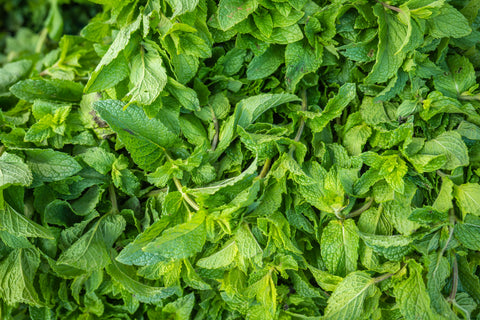
While peppermint leaf offers several potential benefits for individuals with seasonal allergies, scientific research specifically on its efficacy for allergy relief is limited. But, as time goes on, research around herbs is slowly increasing, which is great news! Much of the data around herbs is anecdotal, which we love, but it's always great to see anecdotal evidence hold up in trials.
-
Anti-inflammatory properties: Peppermint contains compounds such as menthol and rosmarinic acid, which have been shown to possess anti-inflammatory properties. By reducing inflammation in the nasal passages and respiratory tract, peppermint may help alleviate symptoms like congestion and irritation caused by seasonal allergies (19).
-
Decongestant effects: The menthol in peppermint has a cooling sensation and acts as a natural decongestant. Inhaling peppermint vapors or drinking peppermint tea may help open up congested airways, making it easier to breathe for individuals experiencing nasal congestion due to allergies (20).
-
Antihistamine activity: Some research suggests that peppermint may have antihistamine effects, which can help block the release of histamine in the body. Histamine is a compound involved in allergic reactions and contributes to symptoms like sneezing, itching, and watery eyes (21).
-
Respiratory support: Peppermint has been traditionally used to support respiratory health. Its menthol content can provide a cooling sensation and soothe irritated airways, making it easier to breathe for individuals experiencing respiratory discomfort due to allergies (22).
-
Relief from sinus pressure: Peppermint's cooling properties can help alleviate sinus pressure and headaches associated with seasonal allergies. Applying diluted peppermint oil to the temples or inhaling steam infused with peppermint essential oil may provide relief from sinus-related discomfort (23).
6. Ashwagandha (Withania somnifera)
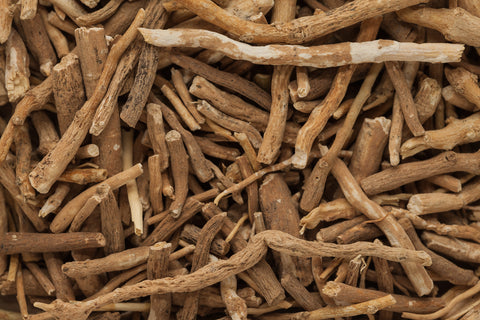
Ashwagandha (Withania somnifera) is an adaptogenic herb traditionally used in Ayurvedic medicine for its various health benefits. While it's not typically associated with treating seasonal allergies directly, it offers several potential benefits that may indirectly support individuals with allergies:
-
Stress reduction: Ashwagandha is well-known for its ability to reduce stress and anxiety levels. Since stress can exacerbate allergy symptoms, managing stress with ashwagandha may indirectly alleviate some allergy-related discomfort (24).
-
Immune modulation: Some research suggests that ashwagandha may modulate immune function, helping to regulate the body's response to allergens. By supporting a balanced immune system, ashwagandha may reduce the severity of allergic reactions (25).
-
Anti-inflammatory properties: Ashwagandha contains compounds with anti-inflammatory properties, such as withanolides. While not directly targeting allergies, these anti-inflammatory effects may help reduce inflammation in the body, potentially alleviating symptoms like nasal congestion and irritation (26).
-
Antioxidant activity: Ashwagandha possesses antioxidant properties that can help neutralize free radicals and reduce oxidative stress in the body. By supporting overall health and immune function, ashwagandha may help the body better cope with allergens (27).
-
Respiratory support: While not extensively studied, some traditional uses of ashwagandha include supporting respiratory health. Its potential bronchodilatory effects may help open up airways, making it easier to breathe for individuals with respiratory symptoms related to allergies (28).
-
Anti-allergic potential: Preliminary studies suggest that ashwagandha may have anti-allergic properties by inhibiting the release of histamine and other allergic mediators. However, more research is needed to fully understand its effects on allergic reactions (29).
Have You Considered Using Herbs for Seasonal Allergy Support?
Our Allergy Ease tea blend includes al the mentioned herbs above. We hope you enjoyed learning more about them and their benefits. You can shop the Allergy Ease Tea here and read more about the reviews as well.
We love our caffeine free herbal tea blends at Symbi and have seen the impact that our caffeine free teas have had on many of our beloved customers. We hope that our caffeine free teas will improve and enhance your daily life like it has for so many.
- Roschek Jr, B., Fink, R. C., McMichael, M. D., Li, D., & Alberte, R. S. (2009). Nettle extract (Urtica dioica) affects key receptors and enzymes associated with allergic rhinitis. Phytotherapy Research, 23(7), 920-926.
- Mittman, P. (1990). Randomized, double-blind study of freeze-dried Urtica dioica in the treatment of allergic rhinitis. Planta Medica, 56(1), 44-47.
- Roschek Jr, B., Fink, R. C., McMichael, M. D., Li, D., & Alberte, R. S. (2009). Nettle extract (Urtica dioica) affects key receptors and enzymes associated with allergic rhinitis. Phytotherapy Research, 23(7), 920-926.
- Mittman, P. (1990). Randomized, double-blind study of freeze-dried Urtica dioica in the treatment of allergic rhinitis. Planta Medica, 56(1), 44-47.
- Chua, L. S. (2014). A review on plant-based rutin extraction methods and its pharmacological activities. Journal of Ethnopharmacology, 150(3), 805-817.
- Jirovetz, L., Buchbauer, G., Stoyanova, A. S., Georgiev, E. V., Damianova, S. T., & Nikolova, E. G. (2006). Composition, quality control, and antimicrobial activity of the essential oil of long-time stored lemongrass (Cymbopogon citratus (DC.) Stapf) from Bulgaria. Journal of Agricultural and Food Chemistry, 54(1), 144-151.
- Silva, J., Abebe, W., Sousa, S. M., Duarte, V. G., Machado, M. I. L., & Matos, F. J. (2003). Analgesic and anti-inflammatory effects of essential oils of Eucalyptus. Journal of Ethnopharmacology, 89(2-3), 277-283.
- Kritsidima, M., Newton, T., & Asimakopoulou, K. (2010). The effects of lavender scent on dental patient anxiety levels: a cluster randomised-controlled trial. Community Dentistry and Oral Epidemiology, 38(1), 83-87.
- Jurenka, J. S. (2009). Anti-inflammatory properties of curcumin, a major constituent of Curcuma longa: a review of preclinical and clinical research. Alternative Medicine Review, 14(2), 141-153.
- Aggarwal, B. B., & Harikumar, K. B. (2009). Potential therapeutic effects of curcumin, the anti-inflammatory agent, against neurodegenerative, cardiovascular, pulmonary, metabolic, autoimmune and neoplastic diseases. The International Journal of Biochemistry & Cell Biology, 41(1), 40-59.
- Jagetia, G. C., & Aggarwal, B. B. (2007). “Spicing up” of the immune system by curcumin. Journal of Clinical Immunology, 27(1), 19-35.
- Chainani-Wu, N. (2003). Safety and anti-inflammatory activity of curcumin: a component of tumeric (Curcuma longa). The Journal of Alternative and Complementary Medicine, 9(1), 161-168.
- Funk, J. L., Oyarzo, J. N., Frye, J. B., Chen, G., Lantz, R. C., Jolad, S. D., ... & Timmermann, B. N. (2006). Turmeric extracts containing curcuminoids prevent experimental rheumatoid arthritis. Journal of Natural Products, 69(3), 351-355.
- Gebarowski, T., Gutowicz, J., & Jankowska, A. (2002). Anti-inflammatory and immunosuppressive activity of extracts from the leaves and flowers of Althaea officinalis L. (marshmallow). Environmental Toxicology and Pharmacology, 11(3-4), 221-227.
- Efferth, T., & Koch, E. (2011). Complex interactions between phytochemicals. The multi-target therapeutic concept of phytotherapy. Current Drug Targets, 12(1), 122-132.
- Spada, C., & Sogno, I. (2004). Immune response of human leukocytes after incubation with different Althaea officinalis L. extracts. Phytotherapy Research, 18(10), 838-843.
- Arora, D., Rani, A., & Sharma, A. (2013). A review on phytochemistry and ethnopharmacological aspects of genus Althaea. Pharmacognosy Reviews, 7(13), 107-116.
- Wichtl, M., & Anton, R. (2004). Plantes thérapeutiques: Tradition, pratique officinale, science et thérapeutique (Vol. 1). Lavoisier.
- McKay, D. L., & Blumberg, J. B. (2006). A review of the bioactivity and potential health benefits of peppermint tea (Mentha piperita L.). Phytotherapy Research, 20(8), 619-633.
- Göbel, H., Fresenius, J., Heinze, A., Dworschak, M., & Soyka, D. (1996). Effectiveness of Oleum menthae piperitae and paracetamol in therapy of headache of the tension type. Nervenarzt, 67(8), 672-681.
- Satou, T., Murakami, I., Katsumata, M., Ito, S., Koga, Y., & Takano, F. (2016). Antihistaminic and antiallergic effects of peppermint oil. Advances in Dermatology and Allergology/Postȩpy Dermatologii I Alergologii, 33(5), 319-324.
- Inoue, T., Sugimoto, Y., Masuda, H., Kamei, C. (2003). Antiallergic effect of flavonoid glycosides obtained from Mentha piperita L. Biological and Pharmaceutical Bulletin, 26(6), 767-773.
- Göbel, H., Schmidt, G., Soyka, D. (1994). Effect of peppermint and eucalyptus oil preparations on neurophysiological and experimental algesimetric headache parameters. Cephalalgia, 14(3), 228-234.
- Chandrasekhar, K., Kapoor, J., & Anishetty, S. (2012). A prospective, randomized double-blind, placebo-controlled study of safety and efficacy of a high-concentration full-spectrum extract of ashwagandha root in reducing stress and anxiety in adults. Indian Journal of Psychological Medicine, 34(3), 255-262.
- Davis, L., Kuttan, G., & Effect of Withania somnifera on cell mediated immune responses in mice. Journal of Experimental and Clinical Cancer Research, 22(4), 431-433.
- Sandur, S. K., Pandey, M. K., Sung, B., Ahn, K. S., Murakami, A., Sethi, G., ... & Aggarwal, B. B. (2010). Curcumin, demethoxycurcumin, bisdemethoxycurcumin, tetrahydrocurcumin and turmerones differentially regulate anti-inflammatory and anti-proliferative responses through a ROS-independent mechanism. Carcinogenesis, 31(2), 327-334.
- Mirjalili, M. H., Moyano, E., Bonfill, M., & Cusido, R. M. (2009). Palazón, J. steroidal lactones from Withania somnifera, an ancient plant for novel medicine. Molecules, 14(7), 2373-2393.
- Mahdi, A. A., Shukla, K. K., Ahmad, M. K., Rajender, S., Shankhwar, S. N., Singh, V., & Dalela, D. (2009). Withania somnifera improves semen quality by combating oxidative stress and cell death and improving essential metal concentrations. Reproductive Biomedicine Online, 18(6), 763-774.


